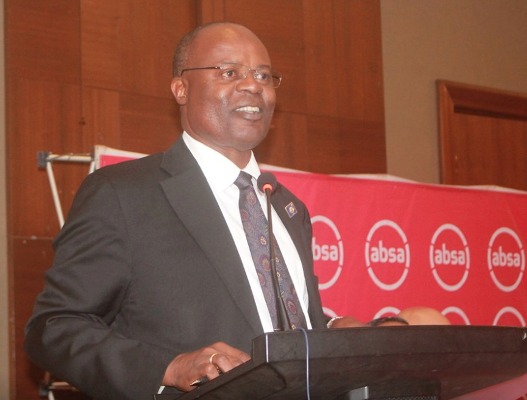The Central Banks in the East African Community shall be exploring ways of transforming the East African Payment System (EAPS) and linking it with other payment solutions on the African continent to enable the seamless transfer of monetary value across the continent at both retail and wholesale levels, Dr. Louis Kasekende, Deputy Governor, Bank of Uganda, has said.
The Deputy Governor made the remarks on Tuesday at the launch of the Absa SME Academy 2019, at the Kampala Sheraton Hotel.
“This should support intra African trade and further support the growth of our commercial enterprises,” Kasekende said.
He advised entrepreneurs to have a vision and belief in the possibilities of creating large enterprises of enduring value.
“You must have the desire and strategic foresight to grow the business firm from its small size start up to a medium or large scale. Surprisingly, this vision is largely missing amongst SMEs with the latest available survey data1for 2015 revealing that the overwhelming majority of enterprises in Uganda did not expect to grow to the extent of employing at least 5 people within a five year period,” he said.
He added: “This trend needs to change and we are not short of examples of entrepreneurs that have started small and scaled the heights. The Late James Mulwana and the Mulwana Group of Companies is a case in point.
The second message is to encourage each one of us to formalize our business units.”
He revealed that formalization may include at the bare minimum, registration and licensing of the enterprise with the respective regulatory authority or local government, setting in place systems for work processes and decision making, and the employment of professional staff.
“These professional staff may not necessarily be permanent employees, especially for the small scale enterprises, but rather qualified professionals whose counsel should be sought to guide any critical business decision,” he said, adding that formalization may infer several benefits such as enabling your access to opportunities in public and private procurements, including taking advantage of the national local content regulatory provisions.
In addition, he said, founders or owners of business enterprises should be ready to detach their personal finances from the business entity. However, this is rare.
Available World Bank Enterprise surveys2data reveals that Uganda has a disproportionate number of medium to large scale firms as sole proprietorships relative to the Sub-Saharan African average. This means that the business owner bears the full impact of a business loss.
“This I believe can change with entrepreneurship training such as in this Absa Academy, so that a larger number of business enterprises can stand a higher chance of transcending the life of the founder or owner,” he said.
He noted that one avenue for financing business growth that remains largely untapped in Uganda is the capital markets with instruments such as private equity placements.
“This financing model remains constrained largely due to the informality of businesses and reluctance by business owners to disclose information, yet transparency and accuracy of business records is a critical issue for anyone to buy equity in any business enterprise,” he said.
He said the issue of high lending interest rates by commercial banks remains topical and several initiatives to sustainably address it are ongoing. “Some of the interventions include implementation of the national financial inclusion strategy that is spearheaded by the Bank of Uganda; the public infrastructure investments and reforms in the financial sector and other arms of government or agencies like judiciary and land registry,” Kasekende said.
He added: “These interventions should result in a lower cost of doing business for the economy as a whole. The supervised financial institutions are also adapting their business models and optimizing technological solutions to reduce on their operating costs which should overtime result in lower interest rates.”
Beyond lending interest rates, Kasekende said, “I must express our displeasure at the relatively high charges being imposed on some of the financial solutions. A case in point are the mobile money charges for sending monetary value within the same network in Uganda, which are currently about double the applicable rate in Kenya and Tanzania, if the local shilling rates are converted into US dollar terms.”





